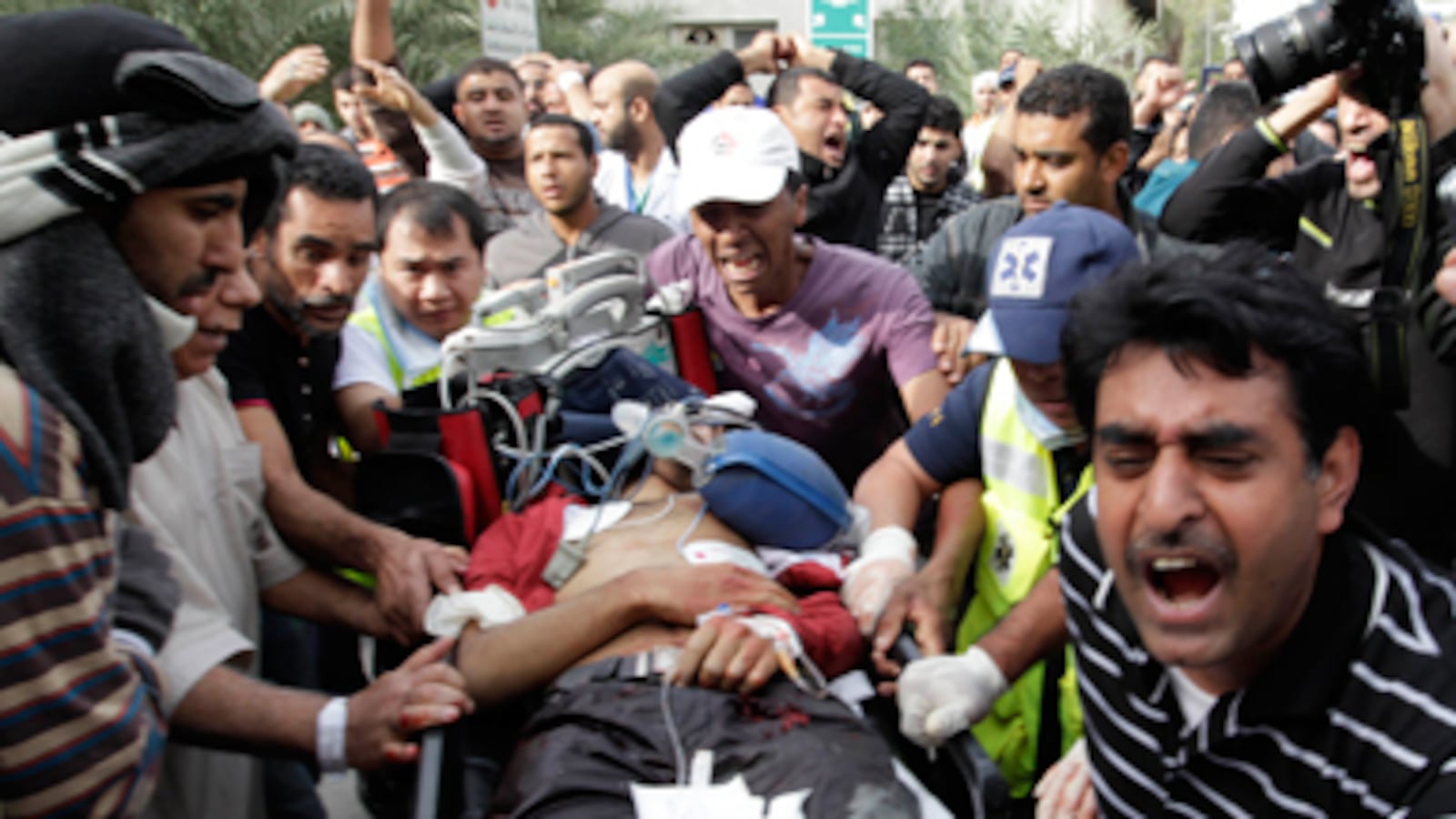UPDATE: After thousands of Bahraini protesters flooded Pearl Square following the withdrawal of the military by Crown Prince Salman on Saturday—one of the protesters’ preconditions for negotiations—it is now being reported that the protesters have retaken Pearl roundabout, a public square that’s been the site of two deadly confrontations between police and demonstrators, resulting in six deaths. Police fired tear gas and rubber bullets to disperse the protesters, and even though several were injured from the oncoming fire, they eventually reclaimed the Pearl roundabout. The crown prince has said he is deeply sorry for the deaths of protesters, and that the government will be open to talks with all parties.
The Daily Beast’s Karen Leigh reported from Bahrain Friday on what demonstrators want and the harrowing rumors of protesters being shot and pushed off bridges. Plus, view photos.
Thousands of people are marching down the main road in Sitwa, a neighborhood of Manama where more than 15,000 Bahrainis live below the poverty level.
Photos: Bahrain Riots

Friday afternoon, it became ground zero for this Gulf country’s ever-growing number of anti-government protesters as it hosted the funeral procession for Ali, the first demonstrator killed by police (shot in the back on Tuesday) and this movement’s greatest martyr.
What the protesters in Sitwa know is how far they’ve come in just 24 hours.
From mere amendments to their rights, they now want to rid Bahrain of its monarchy and ruling government, namely the prime minister, a member of the Khalifa family who’s held office for 39 years.
What they don’t know is what they’d like instead.
Someone democratically elected, yes. Someone Bahraini. Beyond that, they say none of the grassroots opposition leaders have the leadership experience required. But they also say this is “just the beginning, just a start” for the protests. They’re small enough that they can be leaderless, depending on a dedicated group of activist organizers. They’ve got time.
They chant, raise their fists.
“Dear martyr! We will support you with our blood!”
Since the first blood spilled in the early hours of Wednesday morning—when police cracked down on peaceful protesters slumbering in Pearl Square—this protest has seen a dramatic shift.
On Tuesday, demonstrators asked for simple amendments to the current constitution—the same rights for all Bahrainis.
Now, as graphic details emerge about what transpired in Pearl, they want the extreme—the ousting of the ruling monarch, Hamad bin Isa Al Khalifa, and his royal government.
Abdul Wahab Hossein, leader of the Al Wafa opposition group, blares over the loudspeakers. He lists his demands—first, the release of all political prisoners and the dismantling of the government (and what someone next to me calls an “un-legitimate” parliament.)
“We have to develop a new government, an elected government, to be led by a member of this country and decided on by the people—not [just] by Sunnis or Shiites,” he says in Arabic.
“We have to establish a new organization to draft a new constitution.” (The current document, a bystander tells me, “has no room for reform.”)
“The existing parliament is good for nothing. We have to take to justice the Interior Minister and the other officers who gave orders to shoot people.”
The greatest honor in this society is to be martyred, and Ali is getting special treatment. His casket is carried through a crowd and loaded into a sport utility vehicle decorated with Bahraini flags and huge black and white photos of Ali’s own face.
His best friend, propped up by two men, sobs uncontrollably and has to be half-dragged behind the car.
It’s driven down the long main road to the other end of town, to the burial ground where Ali, fearing the worst, had told his father he’d like to be buried next to his uncle.
Behind the car, the demonstration picks up steam. Much larger now than anything ever seen by Pearl Square, the few hundred people I’ve been with since the morning have been joined by thousands of others. They’ve heard the news and called their friends and ahead of us and behind us the sea of young men and women in headscarves goes on and on.
As they walk they sing a rhyme, popular in Bahrain’s culture, typically addressed to the martyr’s mother.
They sing to her now, in Ali’s voice: “Please remember me when you see a marriage ceremony [because I will never get married now.] The candle of my youth—who will put it out? My blood is my tattoo.”
“We are giving a message to the mother—be optimistic. We will not change our demands,” says Mohammed, a Gulf Air steward who’s become one of my walking companions.
(Proving that this is no longer just a demonstration by the marginalized poor, there’s also his friend, who quit his job as an air host to “become a protester,” and Taqi, the general manager of a construction company.)
Underlying cultural issues have bubbled up during these four days of unrest.
Most of the police here are foreigners, and their severe attacks on the Bahrain nationals in Pearl Square have brought to the surface tension between nationals and certain foreigners—like the government-friendly officers—they say treat them badly in their own country.
“It’s an issue of living, of the poverty experienced by so many Bahrainis,” Taqi says.
The expat-heavy nation “brings people in from outside—from Jordan, Pakistan, Saudi—they are all imported. The riot police are imported, and they come and beat us. They have no morals. The Bedouins have two or three wives and lots of children, so now our schools are overcrowded.”
Then, of course, there’s economics.
Though most Western media pegs the tension in Manama to classic Sunni-Shiite disputes—the Sunnis, including the ruling family, make up just 5 percent of the population yet seem to control all aspects of its government and economy—it doesn’t seem to be the case on the ground.
Again and again this week I have been told the Sunni vs. Shiite line is government propaganda, meant to deflect its own shortcomings.
There is widespread anger among protesters who say the government’s branding of them as “pro-Iran” makes the Western world apprehensive about their plight.
And even the middle-class Bahrainis are “economic slaves,” Taqi tells me.
“If you, the king, control all the sources of money and only give it to your own [family] while people are starving, what else is that but slavery?”
Another man says people in Sitwa “don’t have enough money to buy lunch and dinner in a day. They have to choose one or the other.” But the Khalifa, he laughs, spent 120 million Bahraini dinars ($318 million) on a bowl made of pearls.
“He gave it to his wife.”
As the afternoon continues, everyone’s on the phone to friends at other protest sites. They’re coordinating what’s to come later—unlike in Egypt, where some citizens turned on each other, this is a one-aim grassroots group effort—and trying to figure out when the police will strike next.
Military helicopters have been droning overhead all day.
It could be once the funeral’s over, they warn. We’ve identified which allies to run down should tear gas, rubber pellets, and shotguns make another appearance.
They get angrier as details from Thursday’s attack continue to pour in—Bahrain is a low-tech country and news can take a while to go from neighborhood to neighborhood.
Friday’s rumors say officers in Pearl Square bound and handcuffed demonstrators, then pushed them off a nearby freeway bridge.
“That’s why there were so many people with broken bones,” Mohammed says.
There’s discussion of the 60-year-old man shot at point-blank range while he lay sleeping—his face was blown away, and he’s already become a legend among the protesters.
“It was an execution,” one says.
There’s also speculation about the 48 demonstrators who have been missing from Pearl since Thursday morning.
A body was found in the sea, someone calls over.
Another guy, draped in a Bahraini flag, says the missing are all dead and the bodies have been taken to Saudi Arabia via causeway.
It’s impossible to know.
Bahrain's king praised the military Friday, with Iran’s Press TV saying he “stressed that the government has widened the scope for 'peaceful and legal freedom of expression.'”
Press TV also said he has discussed continuing strategy with Commander in Chief Shaikh Khalifa bin Ahmed Al Khalifa and top-ranking defense officials.
In the U.S., whose ties to its strong Gulf ally encompass Bahrain’s hosting of the Navy’s Fifth Fleet, Secretary of State Hillary Clinton (who in December referred to the island nation as a “model” foreign partner) urged “restraint” Thursday in a call to Foreign Minister Shaikh Khalid Bin Ahmad Al Khalifa—a statement that was viewed by most on the ground in Sitwa as “weak.”
In a statement posted on the ministry’s website, minister Khalifa said a commission had been established to determine the cause of the Pearl deaths.
Human Rights Watch, which has been patrolling demonstration sites and hospitals here, has been trying desperately to prove that shots from real guns—and not just fake pellets—were fired Thursday.
“The commission will carry out its work impartially and transparently,” the statement said. “We call upon all states and international organizations to strive for truth and accuracy, and not to prejudge matters in advance of the conclusions of the investigation.”
At a hospital near Pearl early Friday, an aid worker who wished (for this portion of our conversation) to remain anonymous showed me a death certificate.
Under cause of death: entry by plastic foreign object.
“Does that mean it was definitely a bullet?” I asked.
She folded it away. “It means it’ll never leave this hospital.”
Back in Sitwa Friday, it’s almost 3 p.m. The sun’s scorching, and people have wrapped themselves in Bahraini flags.
An elderly history teacher explains the meaning of their red and white jags—“We are taught that it’s the number of battles the Khalif had to fight to come and establish this country. They teach people here that he came by blood. On Thursday, he tried to say—we came here by blood, we will not leave here without blood.”
As he disappears into the crowd, a tall guy runs down the protest rank. It’s a small town, Manama, and even smaller among the movement’s young, mostly male population.
Taqi recognizes the runner as a friend from high school. “We were in the same class. He spent a lot of years in jail.”
(I’ve heard this time and time again in Bahrain—I know this guy. My father. My friend’s brother. Everyone marching seems to know a political prisoner.)
On our way out of Sitwa, a hotshot drives by Mohammed’s car. As I get in, he takes stock of the notebook and camera. “Down with the Khalifa!” he shouts.
Mohammed’s messaging work on his iPhone. (He’s going to be a little late for the flight to Dubai. Pro-government protesters have been staging car rallies all day, and traffic’s a mess.)
As the guy speeds into traffic, my new friend looks up.
“Well,” he says. “He just told you exactly what he wants.”
Karen Leigh is a reporter and anchor for the Hindustan Times, based in New Delhi. She has written for Time, Bloomberg, the New York Sun, the Cambodia Daily, Entertainment Weekly and Women's Wear Daily.






